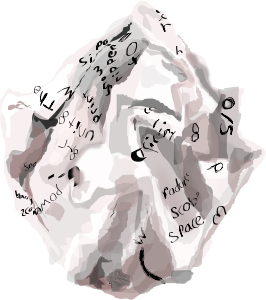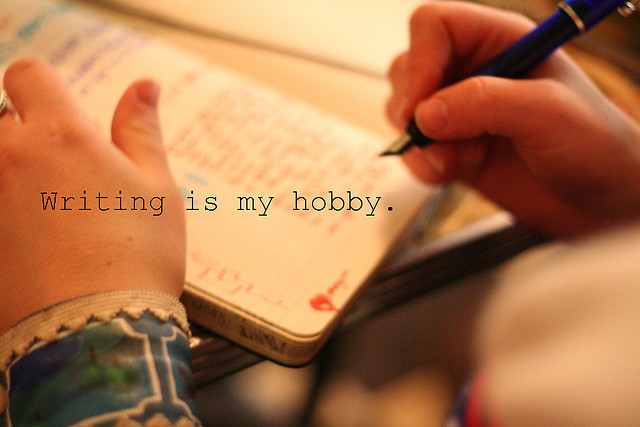Since I started writing papers I enjoyed (say, roughly, ahem, high school age), I’ve tried to save my drafts and final copies of papers.
Why in the world would I do this? you ask.
Well, I enjoy collecting paper. I like stacks of paper all over the place. I like how it looks covering every square centimeter of my desk!

Don’t let your old papers turn into these!
(photo credit: openclipart.com)
No, not really. (Maybe I do like seeing it on my desk, though…) I keep my papers and drafts to help me keep track of my own development over time. It may seem like a silly idea to keep papers from school, but it has actually helped me identify my strengths and challenges in writing.
When I started out writing, I had a hard time with organization. I wasn’t sure where to put a thesis statement, or what a topic sentence was, or how to transition between paragraphs. My first papers were very awkward and stiff, and as I look back over them, I can see how I struggled with my writing. Sentences were awkward, my words were uncomfortable, and I was insecure in my own ability to write and to write well. Yes, you read that right: write well.
Why do I say that? Writing well is something that I’d guess many of us have heard some–if not all–English teachers lecture about at some point in our academic careers. There’s so many different ways to describe and identify “good” writing that it’s difficult to even attempt a definition or explanation. Yet what I mean by good writing is writing where the reader can see the author’s confidence and comfortableness with their own writing. It’s like taking a look at a piece of art where you can see the author is happy in their own skin, happy to have a paintbrush and confident in that they know what they’re doing and what they want to achieve.
When you like your writing and you enjoy it, then you’re going to be more motivated to push yourself to do better, this time and next time. That enjoyment will give you that extra push to keep going, to keep trying to make your writing sound good, to keep fighting writer’s block and long nights with lots of coffee to polish your writing until it shines. (Maybe not that last one. But you get the idea.)
Writing well is a great deal of work. Learning to write well takes even more work. However, holding on to the writing you’ve done can guide you down that path.
Perhaps you still think I’m nuts for holding onto wads of paper.
Perhaps I’ve convinced you that saving your papers may be beneficial to your development.
No matter which camp you’re currently hanging out in, here’s what I want you to consider:
Picture a budding artist. Someone you can think of whose art you like. It can be a painter, musician, writer–anybody you would consider to be “one who does art.” Think about what they might be like before they hit their fame, before their art was well-known. What do you picture? Are you thinking of a virtuosic musician in the basement or garage, writing incredible music all of a sudden? Are you thinking of being hit with a stroke of genius, scribbling down sentence after sentence of spontaneous inspiration?
If you’re thinking of either of these, I want you to throw those thoughts away. Right out that mental back door.
What I want you to think of, and this may take some work, is someone hard at work. Trying something out, seeing how it works, throwing it away when it fails, or making note when it succeeds. Someone who works hard and long hours to produce something amazing.
Ok, you say, I’ve got that image now. What do you want me to do with it?
Keep that one in mind while you think about this next one:
Take that hardworking person and think of how they would grow their skills. Do you think they would try something new until they like the results? I hope you say yes.
Now, what do you think they do with those results? Think about it.
My argument is that most likely they would have taken those results, after seeing what “failed” and what was a wild success, and said to themselves, “You know what? I really liked that. Let’s figure out how to do something that awesome again.”
Now that you’ve taken a little walk down my mental pathway for you, maybe it’s a bit more clear what I’m talking about for holding onto papers. Figuring out how to recapture that awesomeness, when you find you really, really, really liked that paper or that sentence or that phrase, will be much easier to do if you can hold onto your past work.
What I’m NOT saying: don’t recycle your old papers into new ones. Don’t plagiarize your old stuff. You’ll still need to do all the work to write a new paper, but saving your old ones can help you with the structure, format, phrasing, sounds…you name it.
Hold onto your papers. Ones you hate and ones you love and everything in between. Go back and take a look at them while you write your new assignments to not only see what kind of feedback you received last time, but also what sorts of things worked well and that you liked. Yep, that’s right: what you liked.

Make this your goal.
(photo credit: flickr.com)
Enjoying your writing is so important. Readers can tell when the writer enjoys what they’re writing. It’s almost like a window into the happy-room in the mind of the author–readers get to look right in when they sense that the writer is enjoying it.
Aim to keep your papers to continue growing your skills. Hold onto them to make your aim to make what you enjoy evident in your writing. When you enjoy it, the reader can tell.
Work to enjoy your writing. Try new things out, and don’t be afraid of having them fail. But what is even better than first-time success is the sweet results of long hours at work that finally pay off…with you enjoying it.
-Emily, peer tutor